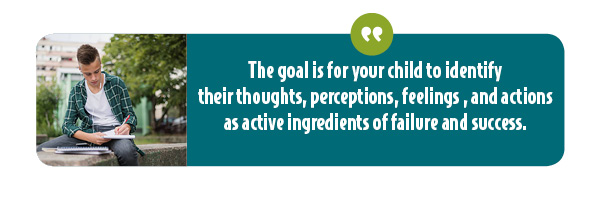Parents often tell me they don't understand why their preteens react over "nothing" or why their teens are so disrespectful and "in your face." Teenage emotions run the gamut. They can range from elation to depression, from giddiness to gloom, from sullenness to intense anger, and quickly from pouting to a blowup. So how does a parent help a teen deal with their emotions effectively?
Teaching emotional intelligence to teens is a monumental task given their raging hormones, a brain still under construction, school pressures, peer influence, cultural mixed messages, and tech addiction. It's no wonder that teens can't seem to control themselves—so many challenges!
Estimated reading time: 5 minutes
Teenage Self-Regulation and Emotional Control Is Largely Taught Through Parental Responses
All parents want their children to be respectful, cultivate emotional maturity, and express their feelings in healthy ways. We all want the end result to be a loving, responsible, happy, and successful adult. However, many parents expect teens to have emotional control without giving them the raw materials to build it. Emotional maturity is a process, not an arrival point.
What we fail to grasp is that emotional self-control involves learned and modeled abilities that develop through thousands of interactions with parents and caregivers, from infancy through adolescence and into young adulthood. Our teens should have a sign posted on their chests that says, "Work in Progress."
Teens don't wake up one day having magically discovered how to control their emotions. Emotional regulation takes practice. Controlling emotions while also expressing them appropriately is a difficult and complex skill. And teenagers need support, empathy, and guidance. Just like a plant needs the right amount of sunlight, water, nutrients, and proper soil to grow healthy, your child needs the right input so he or she naturally develops self-control.
Related reading: "How to Teach Children Empathy and Create Understanding."
Vital Ingredients for Your Teen to Grow a Healthy Emotional Life
There are certain consistent ingredients necessary for our preteens and teens to develop emotional maturity. Just like giving a plant an optimal environment, by our responses as parents, we can create the environment that allows a child to thrive into and through adolescence. Here are some of the vital ingredients we can give our children, preteens, and teens to help them develop emotional self-control:- A calm and accurate mirror for the child's feelings so that the child or teen can see clearly and better understand what they are feeling
- Safety, understanding, and empathy for the teen to work through their experiences and feelings
- Firm and consistent limits that are appropriate for their developmental stage
- Modeling of healthy expression of emotions
- Loving guidance to help teens learn appropriate expression of emotions
- An experience of their impact on others
Parents can only provide these ingredients when they take the time to pay attention to their own internal experience and emotions before reacting to the teen's behaviors. The key is to calm your own emotions and reconnect with your love of the teen before responding. The trick is that parents need emotional intelligence before they're able to pull this off!
Related reading: "What Is Emotional Intelligence?" 
Being Real and Human as a Model for Teens
Children build emotional intelligence by seeing and experiencing loving, compassionate, yet firm responses from their primary caregivers. The most effective way for parents to provide all of the ingredients listed above is by taking responsibility for our own emotional well-being and by being real—in other words, accepting that we are human (not perfect, not superheroes). This means accepting our own faults and having self-compassion in how we respond to ourselves when we make a mistake. Taking care of ourselves is critical so we are able to manage our strong emotions. To model effectively also means apologizing and doing repairs when we do slip up and yell (remember, we're human).
By modeling a compassionate and authentic relationship with ourselves, we give our children the biggest boost of emotional intelligence possible.
Below are some keys to help you create an awesome relationship with your own emotional self and some actions to support your preteen's or teen's unfolding emotional nature. And as a result, they will develop emotional maturity organically!
Deep Dive: "Stop! These Things Will Destroy Responsibility in Children!"
How to Create an Authentic Relationship with Your Emotions—and Your Teen!
ACTION 1 - Suspend judgment of your own and your teen's emotions.
When we view emotions as good or bad, positive or negative, we are comparing and judging. Yet all of us have emotions; they are simply energy in motion guiding us back to our True North.
When we or our teen acts out in a certain way (e.g., one of us has an emotional outburst), we typically label that behavior or emotion as "bad." When we do this, we also tend to overreact in a knee-jerk fashion and move to fix or stop the emotion or behavior. This, in turn, often leads to our teen either erupting or stuffing their emotions rather than growing emotional strength. (We cannot build the muscles of emotional strength without exercise.)
What if instead, we viewed emotion as a compass and behavior simply as communication? What happens to our attitude toward ourselves and our teen now? Right—we are able to step back and respond with more compassion. We are now seeking to understand—and therefore, we tend to respond to what we or our teen needs rather than just trying to stop the emotion or change or fix the behavior. When we take this kind of action, we give our child the opportunity to practice and build emotional muscles while teaching the child to be responsible for their own emotions.
Related reading: "Teenage Rebellion Is a Cry for Connection and Love."

ACTION 2 - Pay attention and tend to your own emotions before responding to your preteen or teen.
If you need to calm yourself before responding, do it! Say, "I'll handle this when I've had some time to think about it." Or "I'm ready to blow. I'm going out on the deck to calm down." Or "I'm not ready to talk about this; I'm too upset." Wait—whether a minute or a day—before responding to your teen. This also gives them time to stew, feel, calm, and think about things. And you get the bonus of modeling self-calming to your preteen or teen!
Parental self-regulation is one of the greatest keys to parenting effectively and this monitoring of emotions and self-soothing is especially crucial during the teenage years, which can be challenging.
ACTION 3 - Accurately reflect your preteen's or teen's emotions.
The more accurately we can mirror back their emotions, the more they integrate the understanding of their emotional experience. When we react, they don't get to feel, own, or resolve their own emotions because the situation becomes about our upset and what we're feeling instead.
With an accurate mirror, the teen can better understand and integrate some very valuable lessons:
LESSON #1 - all feelings are okay and I can handle my feelings and express them;
LESSON #2 - my feelings are my responsibility;
LESSON #3 - feelings are transient and will dissipate when listened to;
LESSON #4 - feelings teach me to take actions to care for myself better;
LESSON #5 - my responses have an impact on others.
Related reading: "3 Critical Skills that Every Teenager Needs."
ACTION 4 - Empathize with their feelings.
Feelings that are validated are diffused, but feelings unacknowledged tend to build up until they are discharged—often at inconvenient times, as you may have noticed. Providing a safe space for your preteen or teen to feel emotions, especially intense emotions, gives your teen a way to practice managing and redirecting emotions in positive and appropriate ways under your tutelage. Giving, teaching, and modeling empathy are key for surfing the strong emotions of the teenage years. And sometimes, it's important just to laugh with them, too.
ACTION 5 - Describe what you see and how their behavior affects you.
Let children and teens know your observations ... without judgment. What is their facial expression? (Sad, happy, angry, etc.) What is their body language telling you? (Arms crossed, fist clenched, etc.) What is the tone of their voice? (Discouraged, excited, etc.) By specifically describing what you see, you help the child or teen connect the dots and realize that emotions affect our bodies and our relationships.
Listen to the Body Language of Your Teen
Sometimes a preteen or teen will say they are fine, but their body language says otherwise. In this case, it is important to point out to them that what they are saying is different than what you see. When you point out this discrepancy, your preteen or teen can then check in with their own internal experience and own a feeling they may have been avoiding. This also lends itself to a possible dialogue, giving you an opportunity to mentor.
Sometimes all the teen needs to move on is acceptance of their feelings. And other times, they need to know how their behavior affects us. For instance, we might say, "Wow! That is some really intense energy coming at me! It makes me want to pull back." Or "I want to hear what you have to say. I'll be in the kitchen when you're ready to talk to me respectfully and stop yelling." Or "What you have to say is important to me, and it looks like you could use some time to chill before we talk."
Remembering that both you and your preteen/teen are human and that emotional maturity is a process of growth, not an arrival point, helps us to relax. What we want to truly focus on is building healthy, loving, and strong relationships: relationships with ourselves (including with our emotions) and relationships with our spouse, our teen, our community, and the world.

Be compassionate with yourself. Stay grounded in your love for your preteen or teen. Be present to your own experience, and from a strong and centered space, respond to your teen. These parental responses will gift you and your teen enormous benefits, including a healthy and loving relationship!
For personalized support and for skills for conscious parenting, contact us at support@Heartmanity.com. Or visit our Hacking the Teen Brain parenting class and resource page.
For more information on parenting teens, read: Keys to Turn Defiance into Healthy Self-esteem and Is Teenage Rebellion Normal?









